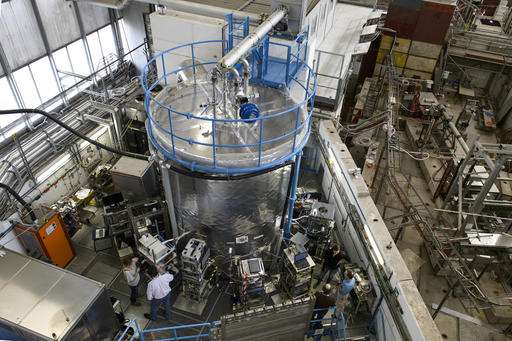New cloud formation discovery may lessen warming forecast

A new discovery about how clouds form may scale back some of the more dire predictions about temperature increases caused by man-made global warming.
That's because it implies that a key assumption for making such predictions is a bit off.
"What this will do is slightly reduce and sharpen the projections for temperature during the 21st century," said researcher Jasper Kirkby.
Nonetheless, he added, "We are definitely warming the planet."
Kirby works at the European Center for Nuclear Research, or CERN. He is the lead author of one of three studies on the topic released Wednesday by the journals Nature and Science.
Essentially, the work reveals a previously unknown natural process that in a complex way creates atmospheric particles around which clouds form. The most common source of particles is air pollution, usually sulfuric acid from the burning of fossil fuels. There are also natural sources, but they have been considered far less important for cloud formation.
The new work shows that a combination of cosmic rays from space and gases emitted by trees also creates particles, and then clouds, without man-made pollution. The scientists witnessed this in a cloud simulation chamber and from a Swiss mountaintop observatory more than two miles high (3.5 kilometers).
"This process is only effective in pristine environments and there are very, very few pristine environments left on Earth," Kirkby said. Nowadays, the process is overwhelmed by pollution particles.
To a layman, the significance of this for predictions of global warming may appear a bit, um, cloudy. But here's how it works:
The computer models used to make those predictions require making assumptions about what conditions were like before industrialization, when the widespread burning of coal, oil and gas began pumping greenhouse gases into the air. Clouds are an important factor in this because they cool the Earth by reflecting sunlight back to space.
Nobody knows just how cloudy skies were in the old days. Scientists have figured there were far fewer clouds than now, Kirby said. But the discovery of a new natural route to cloud formation suggests that cloud cover was in fact greater than scientists had assumed.
If so, the way these simulations work, it would mean that greenhouse gases haven't been quite as potent in producing warming so far as scientists thought. So, ton for ton, they may not be quite as potent in producing future warming either.
Kirby said it's too soon to tell how much less warming the new study implies. Other recent studies found flaws in climate forecasts because of uncertainty about clouds that would increase, not decrease, possible warming in the future.
A better understanding of clouds is good, but much more work is needed before scientists dial down warming estimates for the future, said Yale scientist Trude Storelvmo and NASA climate scientist Kate Marvel, who didn't participate in the new work.
More information: "New particle formation in the free troposphere: A question of chemistry and timing," Science, DOI: 10.1126/science.aad5456
Jasper Kirkby et al. Ion-induced nucleation of pure biogenic particles, Nature (2016). DOI: 10.1038/nature17953
Jasmin Tröstl et al. The role of low-volatility organic compounds in initial particle growth in the atmosphere, Nature (2016). DOI: 10.1038/nature18271
© 2016 The Associated Press. All rights reserved.


















